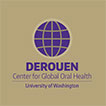When I was younger, I was convinced the most outgoing, confident, powerful, and assertive people made the best leaders. Those who were the first to break a silence or those who continuously shared their opinions seemed to rise to the top. As I witness authority figures in my life lead others, I realize there is not one correct way to lead. After joining the DeRouen team and diving into the realm of Global Health research, I expanded my definition of leadership, increased my knowledge of the characteristics of a leader, and was inspired to reflect on my personal leadership philosophy.

I strive to maintain a flexible definition of leadership, as my existing ideas are modified by new experiences. Reflecting on my history of leadership experiences, I have concluded the following ideas. I believe the best leaders lead through a philosophy rooted in servant leadership. Sharing responsibility, power, and influence allows a true leader to encourage others to be the best versions of themselves instead of taking control and forcing others to follow. A true leader does not focus on making themselves shine brighter than everyone else, but instead focuses on making as many individuals shine as bright as possible. A leader will hold the most influence when they focus their attention on improving each other’s lives instead of trying to solely improve their own. True leaders meet others in times of struggle and walk with them through it. Although I have recently came to these conclusions, I recognize my definition of leadership may be completely different than another person’s definition, and still differs from my definition of leadership years ago.
When I decided to pursue a leadership role in planning the DeRouen Center’s first Global Oral Health Symposium, a plethora of fears arose. How was I expected to devote the necessary time to thoroughly plan a research symposium, while juggling graduating from the University of Washington, working twenty hours per week, and maintaining my emotional and physical health as well? It was a daunting task, but soon I realized a key component of any true leader: task delegation.
I owe much of the symposium’s success to the Center’s recently appointed director, Dr. Ana Lucia Seminario. As my mentor, Dr. Seminario quickly witnessed my learning style and encouraged me delegate tasks to other team members. I learned that every member of our team had valuable skills to contribute to the planning and execution phases of the symposium, but it was challenging for me to assign other team members tasks and pass on responsibility. Yet, a team does not win a race by having one member sprint the entire way, but by learning to pass the baton in the most efficient way possible. I gained an immense amount of respect and trust for my team members, as they took on tasks with full responsibility and effort. The DeRouen Center’s first symposium was a true success for many reasons, but the execution of the symposium was impossible without the work and shared vision of every DeRouen team member.
As I reflect on this successful event and plan for the future, I am extremely excited to watch the DeRouen Center grow and expand. I wholeheartedly believe this organization will thrive if we keep our values of sustainability, advancement and innovation, compassion, and collaboration as priorities. The best way to achieve our mission of improving quality of life by promoting collaboration and inclusivity in oral and craniofacial research is by leading with a philosophy of servant leadership.
